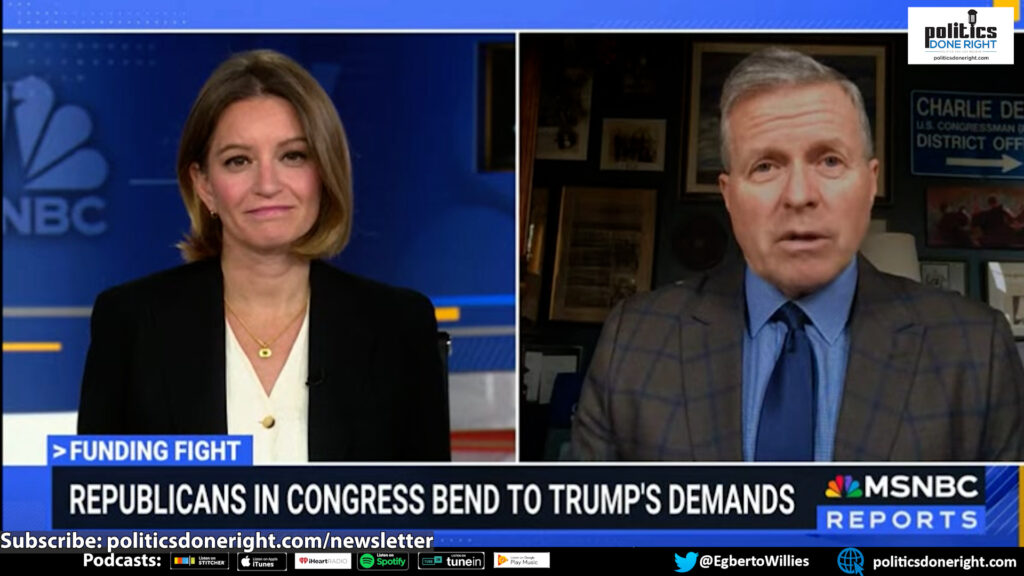Former Rep. Charlie Dent did not mince his words as he called out Trump as a useful idiot to Russia. He had choice words for Trump sycophants as well.
Charlie Dent: Trump’s Putin’s Useful Idiot
Podcasts (Video — Audio)
The discourse surrounding former President Donald Trump‘s relationship with Russia and NATO has been a topic of fervent debate and scrutiny. This discourse was recently augmented by the incisive commentary of former GOP Representative Charlie Dent, who characterized Trump’s actions as surpassing the label of a “useful idiot” in the context of Russian affairs. Dent’s critique sheds light on the intricate dynamics of international relations and underscores a broader introspection within the Republican Party, grappling with its identity in the post-Trump era.
The concept of NATO, a cornerstone of post-World War II transatlantic security, has been fundamentally misunderstood or misrepresented by Trump, according to Dent’s perspective. Trump’s insinuation that NATO allies owe dues like a club membership grossly simplifies the nature of the alliance. In reality, NATO’s guideline for defense spending – 2% of GDP – is not a debt owed but a target to strive for, indicative of a collective commitment to mutual defense and stability. Trump’s rhetoric on this issue reveals a lack of understanding of international alliances and dangerously oversimplifies complex global security arrangements.
Moreover, Dent’s critique brings to the forefront the disproportionate military spending of the United States. The country’s defense budget dwarfs that of its allies, raising legitimate questions about the opportunity costs of such expenditures. Could these vast resources be better allocated towards enhancing the domestic welfare of citizens, such as improving the education system or investing in social infrastructure? This line of inquiry is particularly pertinent in a world where the threats are increasingly transnational and non-military, such as climate change, pandemics, and cyber warfare.
The former Congressman’s remarks also touch upon a deeper, more systemic issue within the GOP. David Brooks of The New York Times astutely observes that Trumpism has permeated the core of the Republican Party, reshaping its fundamental beliefs and attitudes. This metamorphosis extends beyond political expediency or alignment with Trump’s populist appeal; it signifies a profound shift in the party’s ideological underpinnings. The embrace of isolationism and nativism, as Dent notes, is not just a departure from traditional conservative values but a paradigm shift that aligns more with Trump’s personal brand than with the party’s historical principles.
Dent’s candid assessment of Trump as advancing the foreign policy objectives of adversaries like Russia and China raises alarming implications. By undermining NATO and sowing discord among allies, Trump’s actions, whether unwitting or deliberate, serve the strategic interests of these nations. This behavior, Dent argues, goes beyond mere folly or ignorance; it borders on complicity, making the term “useful idiot” seem almost euphemistic.
The discourse around Trump’s stance on international affairs, as dissected by Dent, is more than a critique of a single individual’s policies. It reflects the ongoing struggle within the Republican Party to define its post-Trump identity. While figures like Mitch McConnell represent a more traditional conservative approach, the party at large remains in flux, caught between its historical roots and the populist, isolationist tendencies championed by Trump.
Charlie Dent’s commentary analyzes Donald Trump’s approach to Russia and NATO, challenging the simplistic narratives that often dominate political discourse. It calls for a nuanced understanding of international relations and critically examining the Republican Party’s direction in the post-Trump era. As America approaches future elections, the decisions made by voters will determine political leadership and the ideological trajectory of one of its major parties. The hope is that a more informed, thoughtful approach to domestic and international policy will prevail, steering the nation toward a future that prioritizes global stability, cooperation, and the well-being of its citizens.
Viewers are encouraged to subscribe and join the conversation for more insightful commentary and to support progressive messages. Together, we can populate the internet with progressive messages that represent the true aspirations of most Americans.

